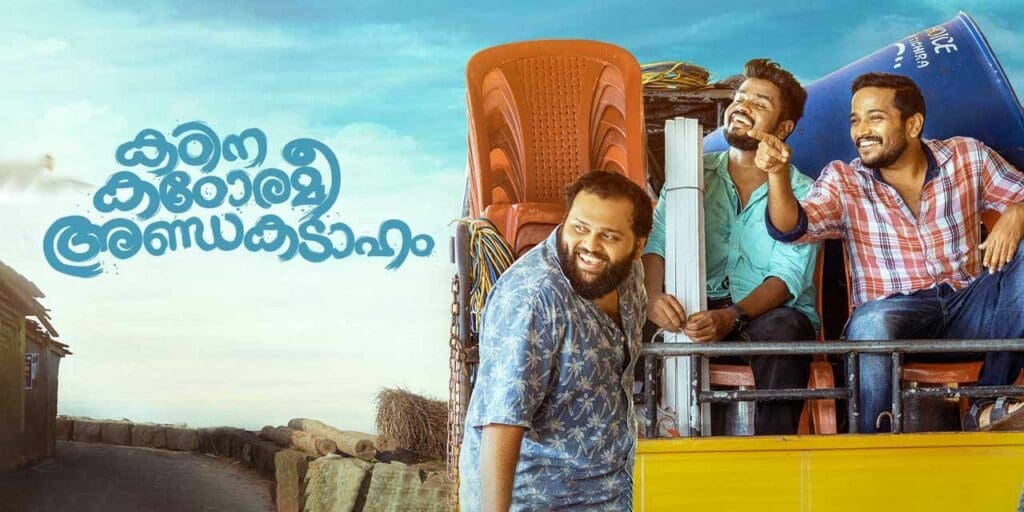
Under the directorial debut of Muhashin and written by Harshad, known for his work on the films Puzhu (2022) and Unda (2019), Malayalam movie Kadina Kadoramee Andakadaham (KKAK) portrays the challenging new-normal days in the life of Bachu, played masterfully by Basil Joseph, against the backdrop of a coastal village in Kallai, Kozhikode. The film effectively depicts the insidious impact of COVID-19, both emotionally and economically, on people.
In its opening moments, the film portrays COVID-19 restrictions and governmental rules in a wry and sarcastic manner, drawing attention to the challenging times we have come through to be present and thriving where we are today. Through the character of Bachu, a determined young man who refuses to succumb to the hardships, the film presents an inspiring portrayal of resilience and perseverance. In Bachu, Basil Joseph performs a role that is different from the comedic roles he typically portrays. Driven by a fierce desire to prove himself a success and to escape the fate of his perceived ‘failed migrant’ father, Bachu fearlessly tries his luck and in different business ventures, causing damage to his personal relationships. Despite the problems, he attempts to achieve success in a new business venture by selling COVID-19 masks. Unfortunately, he is faced with yet another setback, leading to more complicated financial problems and complications in personal relationships. Amidst all the chaos, he receives a tragic news that drastically alters the course of his life.
The COVID-19 pandemic and the constraints it has imposed on our daily lives have pervaded the storylines of films such as Joji (2021), Aarkkariyam (2021), and Santhoshathinte Onnam Rahasyam (2021). Released nearly two years into the pandemic and after the so-called ‘new normal’ has been established and mostly overturned, KKAK aims to document, remind, and bear witness to a time period that has impacted us all in some way, with a sense of innocence. The film distances itself from glorifying the experience of suffering or presenting it as a cathartic phenomenon and explores the idea of deus ex machina in the form of benevolent human nature, which can intervene even in the bleakest of circumstances.
Johnny Antony delivers a touching and brief performance as the police officer who adds a funny yet relatable layer to the story. The roles of Bachu’s mother and sister are played by Sreeja Ravi, a dubbing artist, and Fara Shibla, respectively. Jaffer Idukki’s portrayal of Sulaiman, Bachu’s father’s friend, is another standout performance in the film. Sulaiman’s successful and compassionate nature is always willing to assist Bachu, and he even oversteps his limits to make Bachu an NRI, contrary to Bachu’s desires. Indrans, as Bachu’s father’s longtime friend, provides a poignant touch to the movie with his calm demeanor. Sudheesh plays the crafty yet helpful business partner to Bachu. Swathi Das Prabhu’s character serves as an unwavering friend to Bachu, similar to his character Sathaar in Thallumala (2022). Bachu’s brother-in-law, Rasheed, played by Binu Pappu, delivers a powerful performance, and although his character often disagrees with Bachu, he stands by him during challenging times. Arjun Sethu and S. Mundol took charge of the film’s cinematography. The music for the film was composed by Govind Vasantha, who produced some remarkable tracks such as “Swargakkathu” and “Insha Allah”. In the film, we see the famous COVID-19 star KP Naisal, known for his catchphrase ‘Perfect OK’, playing the character of a reliable, humorous, and kind-hearted auto driver. Another minor character that catches the attention is the excited groom played by Hijaz Iqbal, who is known for his quirky Instagram content.
The film presents a refreshing approach to gender dynamics, particularly in its sensitive portrayal of female characters with agency. The estranged wife, divorced woman, and elderly woman awaiting her life partner are each given distinct situations that allow them to make active decisions about their lives, without reducing them to passive objects. Despite the protagonist’s doubts about his sister’sand mother’s choices, he derives the courage to navigate his journey from the presence of the powerful women in his life.
Although the movie is set in Kozhikode and the story takes place in a coastal Muslim family, it doesn’t overtly emphasize these details with a multitude of signifiers, as one would observe in mainstream movies. Instead, it uses just the minimal amount required to effectively convey the setting and context, and focuses more on the affect. The film serves to underscore the idea that hardships are eventually followed by ease, echoing the message of the Quranic verse 94:5.
The ones who overcome great obstacles will be changed, and often in unexpected ways. The post-climactic sequence in which Bachu and Bhanu travel through a densely populated election campaign after a hiatus of seven months, deftly serves to balance the emotional state with which the plot ends. The movie prompts a crucial inquiry into our adaptability and how far we are willing to go when we have a strong enough purpose.



